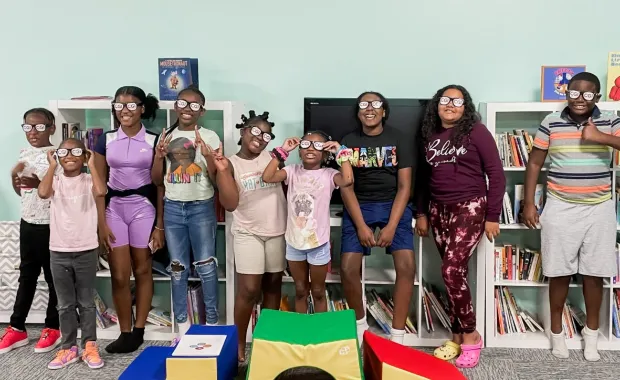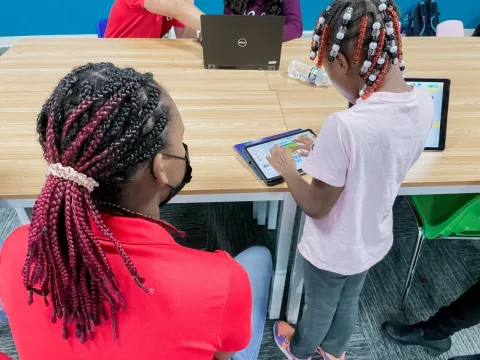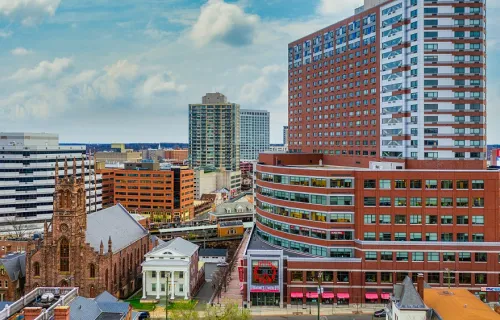At CGI, we demonstrate our commitment to the communities we call home in many ways, one of which is encouraging students to study science, technology, engineering and mathematics (STEM). That includes hands-on work teaching and mentoring students through STEM camps, participation in the Congressional App Challenge and STEM@Home, developed during the early days of the COVID pandemic.
This past summer we partnered with New Hope Community Development, A New Vision Leadership Foundation, the St. Luke Legacy Center and the Boys & Girls Clubs to host STEM camps in Louisiana, Virginia and Washington, D.C. Through those camps we helped school-age students learned about coding, app development and the role of technology in addressing real-world problems like climate change.
Here’s a recap of some of our STEM education projects in local communities.
Lafayette, Louisiana: Preparing students for the app challenge
Gabriel Trahan of CGI Federal’s Emerging Technologies Practice took the lead on STEM camps to teach students how to use Thunkable, a no-code platform for app creation. Trahan and other volunteers worked with local organizations New Hope Community Development and A New Vision Leadership Foundation, both of which serve underprivileged neighborhoods in Lafayette.
“Our goal was to provide a learning opportunity for the students of the New Hope and New Visions groups and prepare them for their Congressional App Challenge by teaching them how to use the Thunkable Coding Blocks interface,” Trahan said. “I certainly believe our goal was achieved. The students seemed to have a great time and learned a lot of valuable skills from it.”
Tackling climate change in Washington, D.C.
The Washington, D.C., summer virtual STEM camp included four different STEM activities over two weeks. CGI Federal’s Manaswini Sahu, (Director, Regulatory Agencies) and Jeff Hughes (Director, International Affairs), led the project, in partnership with the Boys and Girls Club of Greater Washington and with the help of more than 20 CGI volunteers.
The organizers structured the events for two groups of students – ages 5-10 and ages 11-13. The four activities were:
- Climate change: Students learned about carbon dioxide using water and antacid, and gained an understanding of drilling for core samples using modeling clay.
- Improv: Acting like a consultant: Students improvised in two scenarios: Handling customer feedback and advising on a teammate’s unacceptable behavior.
- Sweet Stats: This activity taught students basic concepts of statistics, and how to use images and graphs to convey information.
- Ice Storm: Confronted with a problem that affects the students’ community, they brainstormed and presented possible solutions.
“The curriculum was designed to engage young minds through inquiry and hands-on learning,” Sahu said. “Our goal was to blend technology, scientific method and mathematics together to enhance critical thinking, creativity, problem solving abilities, and overall curiosity for STEM.”
Forming a new partnership in Richmond
Jamie Woltz (Director Consulting Services, CSG) led this STEM camp in partnership with the Saint Luke Legacy Center, which provides affordable mental health services for youth and adults in Richmond’s Jackson Ward community.
The Legacy Center invited us to provide the STEM camp for children active in the center’s summer program. CGI volunteers put in extra hours to provide a great experience for kids living on the north side of Richmond, an under-resourced area for STEM activities.
“The purpose of the camp was to expose the kids to STEM in a way they would not normally be able to experience it,” Woltz said. "As a result of the camp, we formed an ongoing partnership with the St. Luke Legacy Center. We will continue to support the kids in the community and the center through after-school programs and pro bono work."






